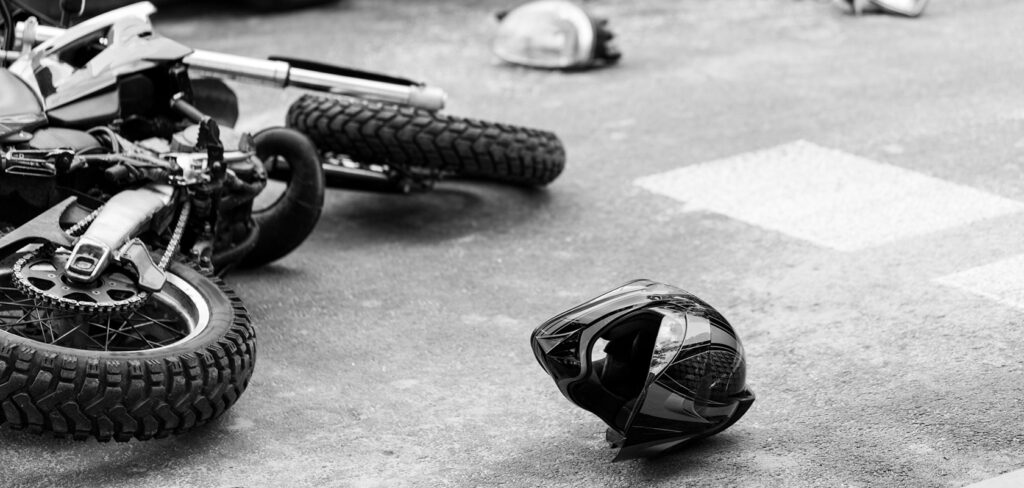
Riding a motorcyclein Illinois can feel freeing — until a reckless driver or bad road turns freedom into disaster. If you ride in Algonquin, often commute through Rockford, or take weekend runs around Huntley, you should know the laws and legal realities that most riders overlook. Here’s a clear, no-fluff look at the rules and how they affect your rights after a crash.
Helmet and protective-gear rules (and how they affect liability)
Illinois is one of the few states that does not require helmets for all riders. That means you won’t be ticketed statewide for going without a helmet, but not wearing one can be raised by insurers as a factor in how your injuries are evaluated. The better the protective gear, the stronger your position when arguing that injuries would not have been worse. Riders should still wear DOT-certified helmets and adequate protection — not because the law forces it, but because evidence shows helmets reduce the risk of fatal head injury.
Also note: Illinois requires eye protection when a motorcycle doesn’t have a windshield — goggles, glasses, or a face shield are not optional in that situation.
Lane splitting and lane filtering rules
Lane splitting — riding between lanes of stopped or moving traffic — is illegal in Illinois. That doesn’t mean riders never squeeze through, but it means insurers, police, or juries can view lane splitting as risky or negligent. There’s a difference between lane splitting and lawful lane sharing (two riders side-by-side in a lane in certain contexts), but the safe path is to avoid lane splitting entirely in Illinois to keep your legal position solid.
Comparative fault and how it affects your recovery
Illinois follows a modified comparative-fault rule:if you are more than 50% at fault for the crash, you cannot recover. If you are 50% or less at fault, your award is reduced by your percentage of fault. That legal rule is crucial for riders because insurers often try to attribute partial blame — failure to signal, speed, or inadequate lighting on the bike — to reduce payouts. Documenting the scene and avoiding early admissions are simple ways to limit insurers’ ability to paint you as the primary cause.
Unsafe-driver defenses you’ll see from insurers
After a motorcycle crash, common defenses include: the rider was speeding, the rider failed to use both brakes correctly, the rider wasn’t wearing protective gear, or the rider “cut off” the car. Your local Algonquin personal injury lawyers and Rockford personal injury lawyers will anticipate those defenses and gather evidence to counter them: calibration of motorcycle brakes, helmet condition, dash-cam footage, witness statements, and reconstruction where needed.
Special considerations for serious injuries
Motorcycle wrecks commonly cause head trauma, spinal injury, complex fractures, and long hospital stays. That triggers a different damage calculus: future care plans, durable medical equipment, long-term therapy, and potential vocational rehabilitation. A motorcycle accident lawyer in Illinois should be able to translate medical prognoses into a life-care plan and a dollar figure that insurers can’t ignore.
What to do right after a motorcycle crash in Illinois
- Call 911 and get medical attention even if you “feel fine.” Delayed symptoms are common.
- Photograph everything: road surface (gravel, oil, potholes), skid marks, vehicle positions, and visible injuries.
- Preserve helmet and gear in a dry, labeled bag (don’t wash them). Their condition matters to the case.
- Get witness contacts and look for nearby security or traffic cameras.
- Don’t admit fault or guess at speeds. Stick to facts when speaking with police.
- Contact a motorcycle accident lawyer in Illinois before giving recorded statements to insurers.
How local context matters (Algonquin, Rockford, Huntley)
Local knowledge helps. Some intersections in Algonquin have sightline issues; certain Rockford corridors see an above-average mix of trucks and commuter traffic; Huntley’s I-90 ramps create tricky merge patterns. An attorney familiar with Northern Illinois roads will know which municipal cameras to check, which local patrol units handle crash reports, and local hospital referral patterns that affect evidence collection.
Key legal lifelines for riders
- Timely medical documentation linking injuries to the crash.
- Rapid evidence preservation (photos, helmet, clothes, cameras).
- Early lawyer involvement to fight unfair fault attributions and to build a life-care and damages case.
Bottom line:Illinois law is not stacked against riders, but it rewards preparedness. Ride smart, protect your body, document everything, and call a qualified motorcycle accident lawyer in Illinois— especially one who understands Algonquin, Rockford, and Northern Illinois roads and courts — as soon as you can.